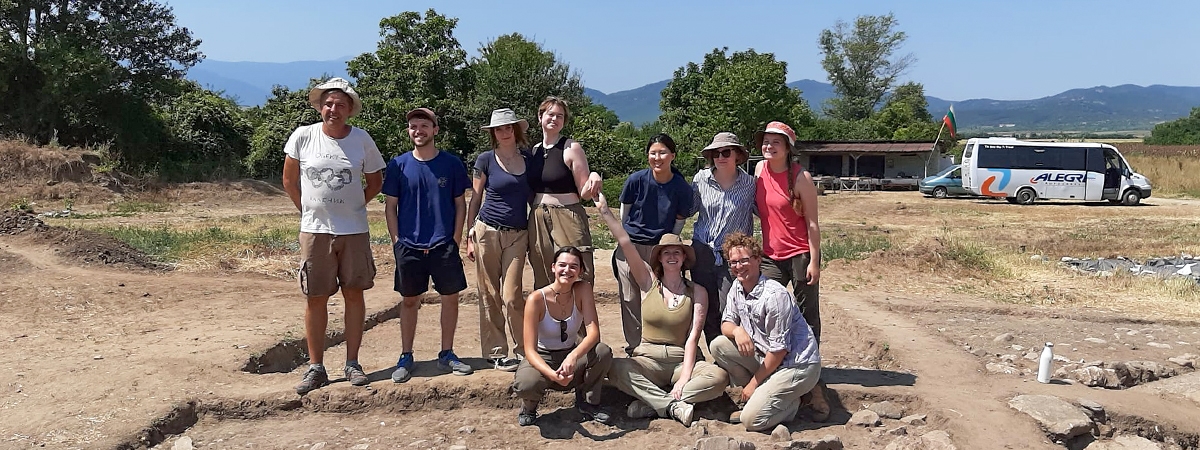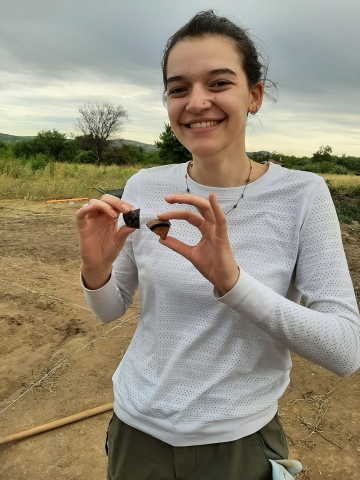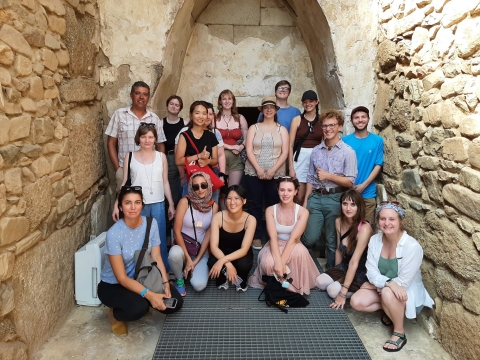Nipissing student expands knowledge of ancient world at archaeological dig in Bulgaria

Nipissing Ancient Studies Student, Gabrielle Leboeuf, and her dig section team at Emporion Pistiors
This summer, Dr. Richard Wenghofer, Associate Professor of Ancient Studies at Nipissing University and Gabrielle Leboeuf, a Nipissing student studying Ancient Studies, had the unique opportunity to participate in an archeological field school at Emporion Pistiros, an ancient Greek trading settlement in the heart of Thrace (modern Bulgaria) run by Balkan Heritage Field School.

While attending the field school, Gabrielle learned the history of ancient Thrace from the late Bronze Age (ca. 1,500 BCE) to the early Hellenistic period (ca. 275 BCE) as well as the practical elements of archeological excavation techniques, archeological surveying, photogrammetry, technical drawing, artefact conservation, restoration, and dating.
In the mornings, Gabrielle excavated the foundation stones of the settlement’s fortification walls and attended lectures in the evenings on the history of the archeology of ancient Thrace given by archaeologists from local museums and from New Bulgaria University. Additionally, she took part in several field trips to other Thracian archaeological sites in Bulgaria, including national archeological museums and the tombs of Thracian kings in Kazanlak in the ‘Valley of the Kings’.
“By engaging in hands-on archeological research, Gabrielle learned how new knowledge of the ancient world is discovered and preserved for future generations,” shared Dr. Wenghofer. “Archaeological field schools are an excellent way to bring study of the ancient world to life by studying ancient cultures in situ, as well as providing valuable technical skills in the area of archaeological research, excavation, and cultural preservation.”
The trip also offered Dr. Wenghofer the opportunity to further his research on the relationship between material culture and history on the peripheries of the Hellenistic worlds.
For Gabrielle, the most interesting part of this trip was being able to experience an archaeological dig firsthand. She shared that they were not only finding remains of Greek artifacts, but also learning more about the Thracians and their history.

“Being able to learn about past cultures through books is fascinating in itself, but to see the remains of past civilizations firsthand enlightened me to how real these people really had been,” shared Gabrielle.
She shared that her archaeological dig in Bulgaria and her overall experience with the Balkan Heritage Field School is one that has changed her perspective and refined her understanding of the Ancient Studies field.
“Although I was already fascinated with Classical Studies, being able to learn firsthand and work with experienced archaeologists, as well as other individuals in the Ancient Studies field opened my eyes to what I could get out of my degree,” she said. “To be able to learn more about Ancient Studies through fieldwork allowed for a unique experience and a sense that I was contributing to acquiring new knowledge in my field. This allowed for a rich experience, greatly impacting my undergraduate studies.”
The experience was part of the course requirements for CLAS 3415 -Field School in Classical Archaeology, which is offered by the Ancient Studies Program at Nipissing. Students interested in attending the 2024 field school at Pistiros can contact Dr. Wenghofer at richardw@nipissingu.ca. Funding is available for students who qualify for the Ilse Mueller Scholarship in Classical Studies.
For more information on Ancient Studies at Nipissing, visit: www.nipissingu.ca/ancientstudies.
